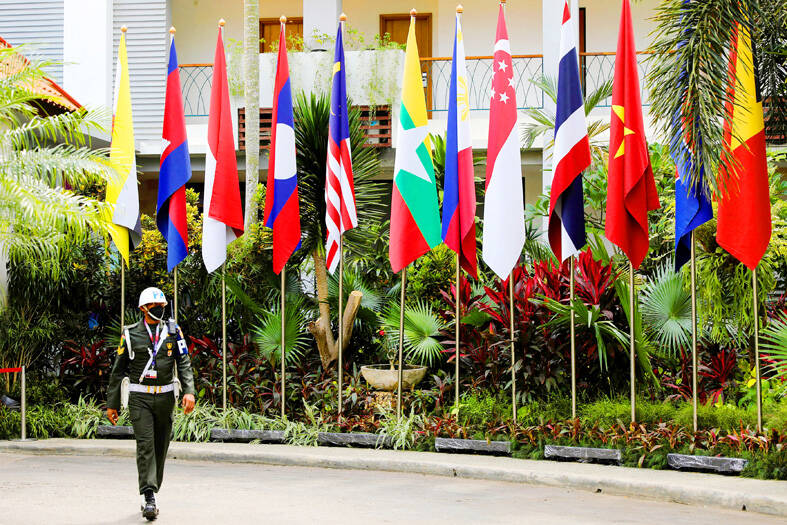Taiwan’s investment in ASEAN markets in the first half of this year surpassed the volume bound for China, as local firms continued to shift manufacturing bases away from the world’s second-largest economy at clients’ urging to avoid US-China trade frictions, the Ministry of Economic Affairs said yesterday.
Approved investments in Southeast Asia reached US$2 billion in the first six months of this year, accounting for 18.1 percent and overtaking China as the No. 1 destination at 17.6 percent, the ministry said in a report.
It attributed the changes to a global supply chain realignment and rising Chinese labor costs.

Photo: Reuters
The phenomenon became evident in 2018 when China-bound investment shrank by 50 percent to the lowest level since 2010 and plunged another 50 percent in 2019, the ministry said.
From 2018 to last year, investment destined for China declined 40.3 percent from the period of 2013 to 2017.
At the same time, investment bound for ASEAN markets grew 40.9 percent, the report said.
The bulk of investment in ASEAN was in manufacturing facilities, at 38.2 percent, followed by financial and insurance service providers (23.5 percent), and wholesale and retail operations (22.3 percent), it said.
By contrast, China-bound investment was focused on manufacturing facilities, it added.
Major local banks have set up branches in Vietnam, Thailand, Cambodia and elsewhere in Southeast Asia to better serve their Taiwanese clients and take advantage of fast-growing economies in the region.
The government has also encouraged investment in ASEAN markets under President Tsai Ing-wen’s (蔡英文) New Southbound Policy to help local companies diversify investment risks.
For the past decade, tech companies have increased their investment in ASEAN markets, whereas previously it was non-tech firms focused on the region, the ministry said.
Today, electronic component suppliers make up for 27.6 percent, followed by vendors of computers and optical devices at 12.2 percent, textile makers at 8.9 percent and base metal product suppliers at 6.2 percent, it said.
In the previous four years, base metal product suppliers accounted for 46.2 percent of investment in the region, far outweighing electronics companies at 24.2 percent, it said.
India emerged as another big beneficiary of the global supply chain realignment, with outbound investment from Taiwan soaring more than threefold after the signing of a bilateral trade agreement in 2018, the ministry said.
Investment in India this year might challenge the five-year average of US$100 million, it said, as India’s vast population has received increased attention from global technology titans and their suppliers.

Semiconductor business between Taiwan and the US is a “win-win” model for both sides given the high level of complementarity, the government said yesterday responding to tariff threats from US President Donald Trump. Home to the world’s largest contract chipmaker, Taiwan Semiconductor Manufacturing Co (TSMC, 台積電), Taiwan is a key link in the global technology supply chain for companies such as Apple Inc and Nvidia Corp. Trump said on Monday he plans to impose tariffs on imported chips, pharmaceuticals and steel in an effort to get the producers to make them in the US. “Taiwan and the US semiconductor and other technology industries

SMALL AND EFFICIENT: The Chinese AI app’s initial success has spurred worries in the US that its tech giants’ massive AI spending needs re-evaluation, a market strategist said Chinese artificial intelligence (AI) start-up DeepSeek’s (深度求索) eponymous AI assistant rocketed to the top of Apple Inc’s iPhone download charts, stirring doubts in Silicon Valley about the strength of the US’ technological dominance. The app’s underlying AI model is widely seen as competitive with OpenAI and Meta Platforms Inc’s latest. Its claim that it cost much less to train and develop triggered share moves across Asia’s supply chain. Chinese tech firms linked to DeepSeek, such as Iflytek Co (科大訊飛), surged yesterday, while chipmaking tool makers like Advantest Corp slumped on the potential threat to demand for Nvidia Corp’s AI accelerators. US stock

The US Federal Reserve is expected to announce a pause in rate cuts on Wednesday, as policymakers look to continue tackling inflation under close and vocal scrutiny from US President Donald Trump. The Fed cut its key lending rate by a full percentage point in the final four months of last year and indicated it would move more cautiously going forward amid an uptick in inflation away from its long-term target of 2 percent. “I think they will do nothing, and I think they should do nothing,” Federal Reserve Bank of St Louis former president Jim Bullard said. “I think the

SUBSIDIES: The nominee for commerce secretary indicated the Trump administration wants to put its stamp on the plan, but not unravel it entirely US President Donald Trump’s pick to lead the agency in charge of a US$52 billion semiconductor subsidy program declined to give it unqualified support, raising questions about the disbursement of funds to companies like Intel Corp and Taiwan Semiconductor Manufacturing Co (台積電). “I can’t say that I can honor something I haven’t read,” Howard Lutnick, Trump’s nominee for commerce secretary, said of the binding CHIPS and Science Act awards in a confirmation hearing on Wednesday. “To the extent monies have been disbursed, I would commit to rigorously enforcing documents that have been signed by those companies to make sure we get